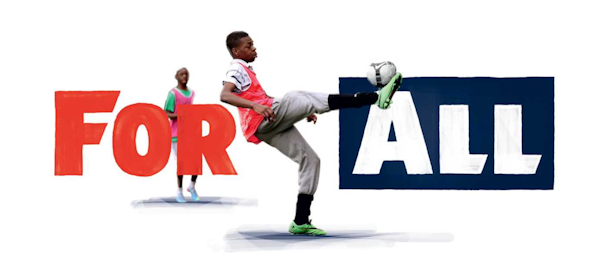English football embarks on a new era as the FA's first marketing push thrusts it into the spotlight
If England football bosses are to shed the culture of impunity that has enveloped the game then any concessions they make internally will need to be matched by a brand that looks and sounds more like the ones it partners with.

The FA's new brand purpose marks the first time that it has launched a marketing campaign
It's the reason why the Football Association's (FA) tasked creative agency VCCP with helping it articulate the brand to fans.
Several issues which were out with its control, such as the Allardyce affair, have cultivated an atmosphere of visceral disgust amongst football fans who have watched as the game they love has become manipulated by money and weighed down by disappointment.
A lack of communication during such turmoil hasn’t helped matters either. Olivia Packshaw, account director at VCCP pointed out that “the FA has never really talked about who they were and what it meant to run English football”.
To this end, the FA has taken a step back and revaluated how it sees itself. The outcome is the ‘For All’ brand strategy, which aims to promote equality within the sport and vanquish the negativity that has tainted the waters of English football.
It marks the first time the FA has invested in marketing itself, a move it hopes will allow it to evolve from the vague figure in the background into something more akin with the major brands it partners with such as Nike, EE and Mars.
“They’ve never really thought of themselves as a brand, they've always considered themselves a governing body," continued Packshaw. "The FA part of it was a corporate brand then they had these sub-brands in England and the FA Cup and they've always advertised their sub-brands, but never really talked about who they were as the FA because they never really had a need to.”
A lack of marketing towards football fans has meant that the wider public's understanding of the organisation has been influenced by what's in front of them, namely the poor results of the men's national team, the disappointing managerial appointments and traumatic resignations, all of which have created a one dimensional image.
Neil Hopkins, director of partnerships at M&C Saatchi Sport and Entertainment, suggested that the FA has endured the “perpetual issue of receiving blame for the negatives associated with the game – which more often than not outside their control – while somehow evading credit for the positive work they do such as growing the women’s game dramatically in recent years.
“The only way out of this vicious circle is clearly to focus on communicating more effectively the breadth and depth of the role it plays across the sport.”
Look no further than at the Premier League's evolution into the marketing behemoth it is today as evidence that governing bodies in sport can remain relatively unhurt from negativity if they are commercially powerful enough.
Having such a strong brand has allowed the Premier League to continue to swell its value despite its criticisms around ticket prices, inconvenient fixture times and a lack of opportunity for young homegrown talent.
However, marketing can only take the image transition so far. If the message is to truly resonate with audiences the FA needs to be seen to be acting on its promises.
Thankfully the structure for this already exits; the FA runs seven disability teams, works with schools to promote Girls Football Week, oversees coaching qualifications and is building hundreds of 3G pitches around the country. The campaign is working to create a mural to showcase this work, helping shed light on the positive aspects which have been clouded by negative publicity and underwhelming performances.
The FA invests £125m a year in the grassroots game, something which wouldn’t be possible without the help of its commercial partners like Nike, Mars, EE and Lidl. With that in mind, the importance of the governing body’s reputation is imperative if it is to maintain such vital commercial partnerships.
“I think the FA has been widely misunderstood for many years,” argued Russell James, director at the FA.
He said that thinking about the FA as a brand and having the “right equity around that” has been the foundation of the campaign and one which looks at the strategies of its partners as a blueprint on how to speak to consumers.
“The likes of Nike, Mars and EE, those brands are doing some really smart things so we've spent time talking to them as well as VCCP, who have a strong portfolio of brands,” said James.
Nike has long been lauded for telling stories in sport and James admitted that the FA “absolutely has looked at brands who have used sport to tell a story”.
But unlike Nike and some of its other commercial partners, the FA’s marketing strategy can be more streamlined because it does not need to invest time and resources into tying its marketing back to its product.
“Football is our story to tell, other brands use that as a position but football is our equity," said James. "If the FA is seen as more competent and more inclusive then you can connect the dots that other organisations and brands would want to work with us.”

